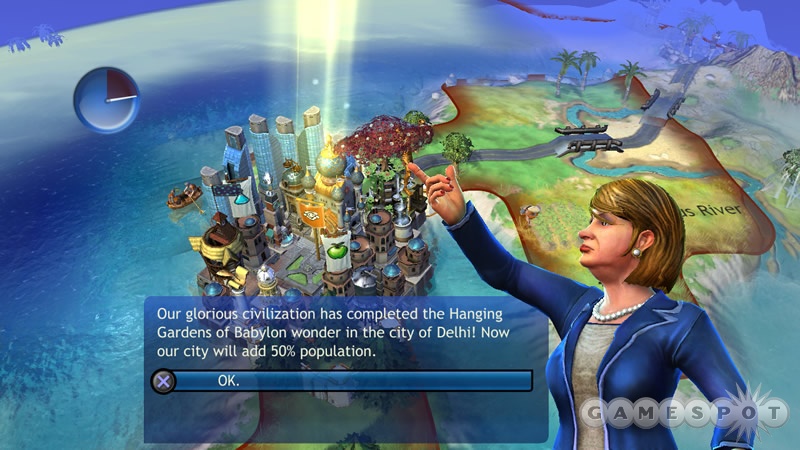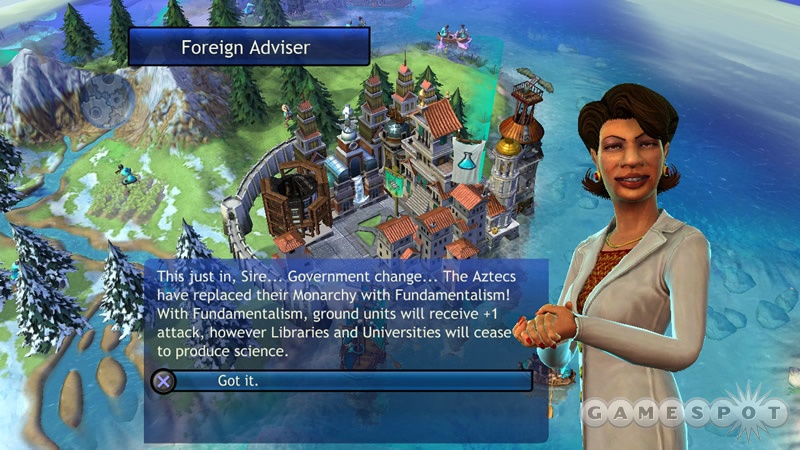Civilization Revolution Updated Hands-On - Rise of a Nuclear Power
It's atomic bombs away in our latest look at this console strategy game.
Following the discovery of nuclear fission in 1934, it took more than a decade to develop nuclear weapons. In Sid Meier's Civilization Revolution, it took us only two hours.
That said, it's a long, hard road to becoming the word's first nuclear superpower in Revolution, which is the first Civilization game developed exclusively for consoles (and the Nintendo DS) since Civilization II way back on the original PlayStation. For the first time we got our hands on the PlayStation 3 version and we can safely say the content is identical to the Xbox 360 version. For our civilization, we selected Abraham Lincoln to grow a tiny village by the name of Washington into a modern metropolis, a home of progressive thinkers, a bastion of learning, and a military stronghold armed to the teeth with intercontinental ballistic missiles. Global thermonuclear war, anyone?

The first thing that old Civ fans may notice when jumping into the single-player campaign--other than the cutesy art style--is how much faster the game plays than previous PC versions. Revolution has been streamlined for the consoles to make Sid Meier's epic empire-building strategies as accessible as possible. You will only have to balance production, population growth, science, and military engagements. Turns move fast because the game will automatically take you to any city that is not building a new unit, and military units move automatically when their paths are queued.
What remains the same, however, is the sheer addiction felt as your civilization asserts its will over an enemy, or when it completes a wonder of the world such as the Hanging Gardens of Babylon, or when you upgrade your medieval knights to modern-day Sherman tanks. If you ever felt yourself putting off work, school, or the affections of a loved one for "just one more turn," that probably won't change here. Thankfully, the game speed is so much faster that you can finish a campaign in only three or four hours.
The road to victory is simple: accumulate 20,000 gold pieces and build the World Bank for an economic victory; attract 20 great people from history to your banner for a cultural victory; or construct several wonders of the world for another type of cultural victory. However, the quickest route is to wipe your enemies from the face of the Earth to earn a bloody domination victory. You can probably guess which route we chose to take.
Early on, our American force met the Mongols, led by Genghis Khan. We stumbled upon his bumbling civilization in only the first few turns, so you can immediately see how quickly the game moves. We offered Khan an olive branch; the Americans are infinitely stronger when they reach the industrial age and start churning out unfathomable amounts of resources faster than you can say cotton gin. Soon we ran into Gandhi and his Indian civilization. The capital city of Delhi was poorly defended, so we opted to overrun it in just a few turns, and we couldn't help but smile at the irony of peace with the warmonger Genghis Khan and war with the peaceful Gandhi. Such is life in Civilization Revolution.
Turns passed. America spread its wings as it's known to do, sending settlers into the far reaches of the map to make the land its own, a sort of virtual manifest destiny. By building libraries and focusing on science, our civilization quickly reached the modern era. The Americans receive a triple production bonus once factories are built, and Lincoln made sure that there was ample work for everyone. Meanwhile, a group of settlers discovered the French Empire in a far corner of the map, led by Napoleon. By this time we had already betrayed Genghis Khan, using rocket-powered artillery units to completely overrun his medieval cavalry units. Only Napoleon remained, but we offered him peace so we could continue on the road to nuclear power, which would assure complete victory. To curb any expansion attempts by the French, we stationed troops at their borders so no settlers could pass. As such, only Paris and Rouen remained.
More turns passed. After we researched literacy, mathematics, and advanced flight, Wilbur Wright joined our cause and helped us to develop flying fortresses. By this time American government had evolved from authoritarian despotism to democracy, and the power of the people does not allow government to attack without provocation. Nevertheless, as much respect as we have for democracy, we didn't build flying fortresses to just look at them. Lincoln quickly proclaimed emancipation from the people and reverted to despotism, a tumultuous switch that resulted in one turn of anarchy, which we didn't even notice other than a hollow rioting sound effect. In the next turn, we ordered the bombers over an army of French archers and watched in glee as their arrows bounced harmlessly off of our hulls, at which point we sentenced them to oblivion.
To his credit, Napoleon sensed defeat and offered olive branches after each turn, hoping for peace. Our submarines and battleships were parked just off of the French coast, and things looked bleak. Meanwhile, our research of atomic theory and nuclear power was complete, and Washington built the world's first atomic weapon. Lincoln took aim at Rouen, and fired.

The skies turned black. The earth shook and Rouen was permanently erased from history, leaving behind nothing more than a radioactive black crater in the ground. Lincoln ordered his units full-speed ahead, and tanks rolled through downtown Paris like it was 1940. Utterly defeated, Napoleon surrendered and America reigned supreme as the lone power in the universe.
So yes, nuclear victory is as enjoyable as ever in Civilization Revolution. One concern we have is that the single-player game is only a randomly generated map on which you compete against four other civilizations. We would have liked to see an epic mode with all 16 civilizations duking it out at once on a realistic map of Earth, but at least there are several challenging scenarios to play through in addition to online multiplayer with a total of five players. And with 16 civilizations, each with its own bonuses and special units, you can bet that there is always a reason to take just one more turn.
Got a news tip or want to contact us directly? Email news@gamespot.com
Join the conversation